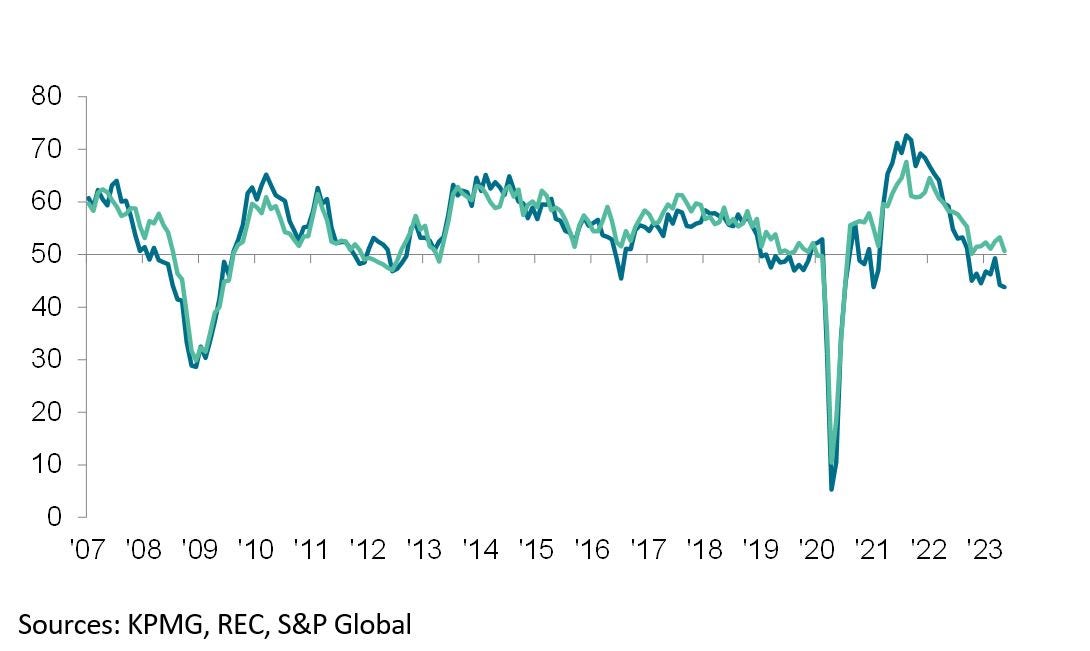and at the quickest rate since January 2021. Temp billings meanwhile expanded at the softest pace since last October and only slightly.
Total candidate supply expands at steepest pace since December 2020
The overall availability of labour improved for the third month running in May. Furthermore, the rate of expansion was the sharpest seen for nearly two-and-a-half years, with recruiters often linking the upturn to redundancies and a slowdown in hiring activity. Permanent candidate availability increased at a sharper rate than that seen for temporary staff. The former rose at the quickest rate for 29 months, while the latter recorded the strongest upturn since February 2021.
Rates of starting pay rise at softer, but still strong rates
The higher cost of living and efforts to attract skilled staff continued to place upward pressure on starting pay during May. Salaries for newly-placed permanent staff rose at a historically sharp pace overall, albeit one that was the softest seen for just over two years. Temp pay growth also edged down since April, and was the second-slowest since April 2021.
Continued…
Vacancies increase at slowest rate in 2023 to date
Growth of demand for staff slowed for the third straight month in May, with overall vacancies expanding at the softest pace since last December. Furthermore, the upturn was the second-weakest recorded since February 2021. Permanent vacancies increased at a faster pace than that seen for temporary roles, but rates of growth were nevertheless the slowest seen for five and 33 months respectively.
Regional and Sector Variations
The drop in permanent placements was broad-based among the four monitored English regions, and led by London.
Temp billings rose sharply in London and the South of England, but declined in the North of England and the Midlands.
Growth of demand for staff was sustained across both the private and public sectors during May. However, rates of expansion moderated across the board compared to April. The strongest rise in vacancies was signalled for temporary positions in the public sector, closely followed by permanent roles in the private sector. The softest upturn in demand was seen for temporary staff in the private sector, which expanded only marginally.
Seven of the ten monitored job sectors recorded increases in demand for permanent staff during May. Hotel & Catering led the upturn, followed by Accounting/Financial. Retail saw a notable decline, while slight falls were registered for IT & Computing and Construction.
Temporary vacancies expanded in just over half of the ten broad employment sectors midway through the second quarter. Hotel & Catering and Engineering recorded the strongest rises in temp staff demand. Retail once again was placed at the bottom of the rankings.
Comments
Commenting on the latest survey results, Claire Warnes, Partner, Skills and Productivity at KPMG UK, said:
“The jobs market remains subdued, with the latest survey results showing dampened hiring activity amid ongoing economic concerns. Overall vacancy growth slowed for the third month as businesses delayed hiring decisions, and permanent staff appointments fell for the eighth month in a row as many employers stick to temps.
“Businesses ready to grow can feel optimistic about an increasing pool of available candidates, which has expanded at the sharpest rate in two-and-a-half years. For job seekers there was more demand for permanent workers in the healthcare, financial and accounting sectors. And while temporary vacancy growth slowed, there are still plenty of opportunities, especially in the hotel and catering industries.
“It’s a tough time for employers, and what they really need is an upskilled and reskilled workforce which can move between sectors and quickly fill their vacancies. This will in turn aid economic recovery. The Government’s new Local Skills Improvement Fund scratches the surface of the problem, but more needs to be done to urgently address the UK’s widening skills gap.”
Neil Carberry, REC Chief Executive, said:
“We’ve been hearing more and more about differences between sectors in hiring rates over the past few months, and today’s data really highlights this. While hospitality, healthcare and engineering remain strong, construction, IT and retail are all weakening. Despite the overall temporary work market continuing to grow – and permanent hiring declining from the sugar rush of 2022 – the story can vary widely across different businesses as their economic outlook remains unclear.
“For hiring businesses, greater candidate availability will help resolves shortages, though inflation means wage growth remains high. In addition, candidates may have to change sectors in their job search, so there is not an automatic increase in candidate supply for shortage roles. All of this puts a premium on getting our response right as businesses – looking at skills development and widening the net of places that firms look for candidates. Recruiters can help with this.
“Government can play its part, too. Proper reform of the Apprenticeship Levy to deliver more flexible and effective training options could help speed sector-to-sector transfers, as could greater use of temporary working to help candidates get a start. Regulation also needs to treat temporary work as a positive option – not a second choice.”
